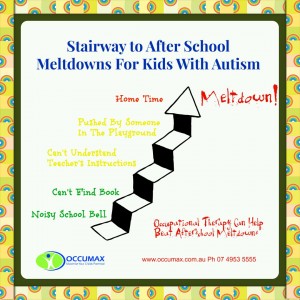We are now a few weeks into the school year and in the Occupational Therapy clinic we are beginning to hear the same old tale from parents …“The teacher says my child has no problems at all in class but when they get home it is like World War Three!” As a parent, this can be so frustrating. You feel like the teacher thinks you are making your child’s anxiety, anger or other behaviours up and at home you still left to pick up the pieces.
Just because children with Autism or other disabilities “appear” to be coping in class, that doesn’t mean that they are not internalising their emotions. As children develop, they do learn to go from externalising their feelings through actions such as hitting, yelling, or stealing toys off others, etc, to internalising what they are feeling with the “little voice” in their head. For example, “I feel annoyed that Sally pushed in” or “I don’t understand what the teacher wants me to do and that makes me feel worried.” The fact that they are moving from externalising to internalising their feelings in the classroom environment could possibly be a sign that all the hard work you have put into social development is starting to pay off.
The problem is, that children who internalise their feelings in the classroom and then explode when they are in the safety and comfort of their own home, often have not mastered the flip side of emotional regulation – knowing what to do with those emotions once you have identified them. For these children, we see (or actually don’t see) a silent escalation of how they are coping with each challenge that they encounter throughout the day. They don’t resolve those feelings so by the time they get home to you, they cannot hold things together for a minute longer so they explode or melt down.
Children who find  themselves on the feelings escalation stairway, often need explicit instructions and skills training to learn how to calm down and how to let go of things that are bothering them. This takes time, love, understanding and a coordinated effort from all parties. Here are five proactive strategies that you and your child’s teacher get started with to help to your child overcome the after school meltdowns.
themselves on the feelings escalation stairway, often need explicit instructions and skills training to learn how to calm down and how to let go of things that are bothering them. This takes time, love, understanding and a coordinated effort from all parties. Here are five proactive strategies that you and your child’s teacher get started with to help to your child overcome the after school meltdowns.
- Be understanding: As hard as it can be to stay calm yourself, you sometimes need to remind yourself that your child has not been plotting home as a battle ground World War Three while they have been in class. They are melting down with you because they feel safe with you. They know that you will know how to give them the love they need and guide them down from the rocky emotional ledge that they feel stuck on in class.
- Give them their space at home to chill out: Try not to schedule too may after school activities in the first term. Have a snack and drink available for them, but don’t push them to communicate. They may want some down time with a special interest toy or heavy work activity such as the trampoline as soon as they come home.
- Let the teacher know what is happening at home. Ask them to look for subtle signs that your child internalising their anxiety, frustration or anger. Children often go under the radar of the teacher because they are quietly doing their work but if you look carefully, you can often see them getting a bit “hot under the collar”.
- Have a visual communication system in class for your child to indicate how they are feeling and that they need a break. You could try an emotions triangle or thermometer, laminated to the child’s desk and small emotions faces that your child can Blu Tack to the triangle/thermometer to communicate how they are feeling to the teacher. Have chill out or special interests available in class for when your child requests a break and don’t use them as a reward. Let your child’s teacher know that your child needs to be able to access their calm down strategies whenever they need them.
- Contact an Occupational Therapist at Occumax (07 4953 5555) to tailor emotional and sensory regulation strategies to your child individual developmental profile.